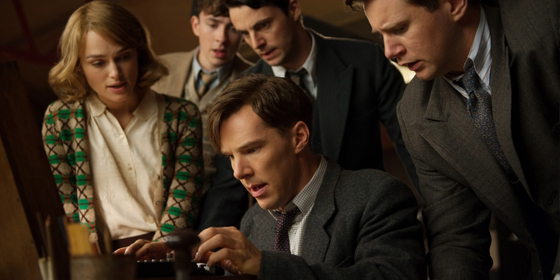The story of World War Two codebreaker Alan Turing is brought to the big screen with class, compassion and a standout performance from Benedict Cumberbatch.
Based largely on Andrew Hodge’s biography, it employs a well-worn but effective flashback device which sees the maths genius (Cumberbatch) relate his story to a police officer in the early 1950s.
As the story unfolds we see how a seemingly odd bachelor in Manchester, with a fondness for electronics projects, was in the previous decades a maths prodigy who would become crucial in defeating the Nazis, and in the process help lay the blueprint for modern computing.
The real life events that inspired this version are both extraordinary and complex, but screenwriter Graham Moore has wisely woven them in to his nicely honed screenplay, with only a handful of overwritten moments (most of them involving his childhood).
Norwegian director Morten Tyldum also brings a compelling pace to proceedings, whilst juggling the complexities of Turing’s life and work with how it affected those around him.
Production designer Maria Djurkovic impressively recreates three time periods (1930s, 40s, 50s) and is aided by some sharp camera work which results in a subtly altered visual sheen for each.
In key supporting roles, it is Mark Strong who stands out as a shadowy MI6 agent, bringing an enigmatic gravitas to his role. Keira Knightley and Matthew Goode, as fellow codebreakers, also do solid work in fairly underwritten parts.
This is a far superior film to Enigma (2001), the Michael Apted film which covered the same story with a somewhat hackneyed thriller premise, which seemed to turn away from the goldmine of the central protagonist.
Perhaps the shrewdest thing this film does is to embrace the puzzle of Turing himself: war hero; rebel; math genius; autistic savant; and finally a victim of the British society he had helped to save.
That the final film works as well as it does, is in large part down to Cumberbatch’s performance.
Although at times it borders on being a little too mannered, it nonetheless feels like we’ve been in the presence of Turing for the duration of the film.
Convincing whether he is answering back to his superiors or colleagues, fragile when worrying about his emotions, and belligerent that his vision will work no matter what, it is the range of emotions on display that make this his best screen performance to date.
Ultimately, the wider story is a bittersweet one, with a war hero unable to see what profound impacts his ideas had on World War II and the development of the computer and the field of artificial intelligence.
The Imitation Game does not seek to sugarcoat Turing’s legacy, nor is it an ‘issue film’ about Britain of the time.
Instead, it acknowledges the complexities of both the man and the times, whilst wrapping it up in a accessible narrative that acknowledges the profound impact he had on the world.
The Imitation Game opened the London Film Festival on Wednesday 8th October
> Official website
> Find out more about Alan Turing on Wikipedia
